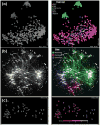Unlocking the potential of metagenomics through replicated experimental design
- PMID: 22678395
- PMCID: PMC4902277
- DOI: 10.1038/nbt.2235
Unlocking the potential of metagenomics through replicated experimental design
Abstract
Metagenomics holds enormous promise for discovering novel enzymes and organisms that are biomarkers or drivers of processes relevant to disease, industry and the environment. In the past two years, we have seen a paradigm shift in metagenomics to the application of cross-sectional and longitudinal studies enabled by advances in DNA sequencing and high-performance computing. These technologies now make it possible to broadly assess microbial diversity and function, allowing systematic investigation of the largely unexplored frontier of microbial life. To achieve this aim, the global scientific community must collaborate and agree upon common objectives and data standards to enable comparative research across the Earth's microbiome. Improvements in comparability of data will facilitate the study of biotechnologically relevant processes, such as bioprospecting for new glycoside hydrolases or identifying novel energy sources.
Figures


References
-
- Falkowski PG, Fenchel T, Delong EF. The microbial engines that drive Earth’s biogeochemical cycles. Science. 2008;320:1034–1039. - PubMed
-
- Fisher RA. The Design of Experiments. 1935
-
- Gilbert JA, et al. In: Bioprospecting using metgaenomics. Himmel M, editor. Springer; 2011.
Publication types
MeSH terms
Grants and funding
LinkOut - more resources
Full Text Sources
Miscellaneous

